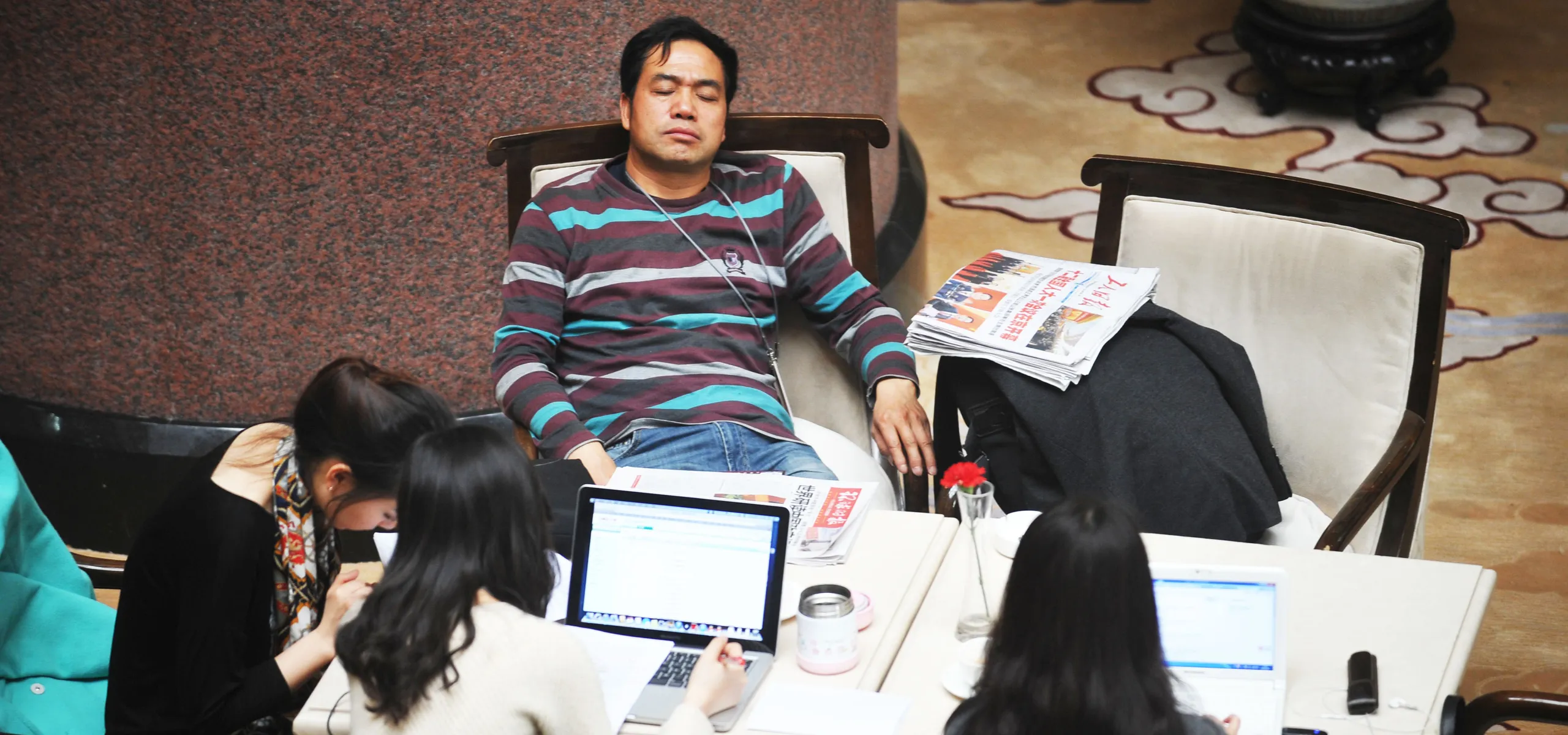Chinese netizens have a new term to describe their exhausting office culture—“work smell”
Workers in China had a tough time following the National Day and Mid-Autumn Festival holiday this year. Due to the much-ridiculed policy of “make-up workdays (调休 tiáoxiū),” employees had to work for seven days straight after the eight-day (actually six work days and a weekend) break.
Now, netizens are asking: What would one smell like after an exhausting experience like that? Answers online include the stinky scent of sweat, the lingering aroma of coffee, or using a new slang term: “the smell of work (班味儿 bānwèir).”
The recent viral phrase refers to the distinct aura of individuals who have entered the workforce and embody the features of a tired office worker, or “corporate livestock (社畜 shèchù)” as they sardonically call themselves: no makeup, loose clothing, a general lack of energy, eyelids weighed down by exhaustion, and a tendency to be easily irritable and emotional (素面朝天,精神涣散,衣着宽松,眼中充满疲惫,情绪暴躁易怒,心理emo sùmiàn cháo tiān, jīngshén huànsàn, yīzhuó kuānsōng, yǎnzhōng chōngmǎn píbèi, qíngxù bàozào yìnù, xīnlǐ emo).
As a matter of fact, you don’t even need seven days to get the smell of work on you, as netizens commented on micro-blogging platform Weibo: “Once you’ve worked a day, you’re already dirty. You can never wash off that ‘smell of work’ in this lifetime. (只要上过一天班你就脏了, ‘班味儿’ 这辈子都洗不掉。Zhǐyào shàngguo yì tiān bān nǐ jiù zāng le, ‘bānwèir’ zhè bèizi dōu xǐbudiào.)”
The longer one works, the stronger the “work smell” will get. New graduates who have just entered the workforce often turn up to the office brimming with energy as they wish to leave a good impression on their colleagues. But the “work smell” soon catches up with them. They begin wearing casual clothing, abandoning daily makeup routines, and smiling less during work hours. As one netizen lamented online: “Half a month ago, I was still a college student with innocent eyes. Now I already feel like work has drained the life out of me. (半个月前我还是个眼神纯真的大学生,现在怎么已经有了被工作吸干阳气的感觉?Bàn gè yuè qián wǒ hái shì gè yǎnshén chúnzhēn de dàxuéshēng, xiànzài zěnme yǐjīng yǒule bèi gōngzuò xīgān yángqì de gǎnjué?)”
For those who fall into this pit of workplace-stress-induced despair, friends remind them that their “work smell is getting too strong and they need a shower (班味儿太重,需要洗洗 bānwèir tài zhòng, xūyào xǐxi).”
However, some “veteran office workers (职场老油条 zhíchǎng lǎoyóutiáo)” have been “marinated in the work smell (已经被班味儿腌入味儿了 yǐjīng bèi bānwèir yān rùwèir le)” so long that there’s no escape.
They have become adept at managing workplace relationships, well-versed in various unspoken office rules, and skilled at slacking off, or “stroking the fish (摸鱼 mōyú).”
Many of them have also developed “reflexes exclusive to workplace professionals (一些职场人专属的条件反射 yìxiē zhíchǎngrén zhuānshǔ de tiáojiàn fǎnshè),” such as the habit of checking work-related group chats even while on vacation and instinctively responding to them with “1” or “yes, copy that (好的,收到 hǎode, shōudào)” to signal “message received” on WeChat.
As one netizen, who presumably stinks of the smell of work, put it on social media: “No matter how hard we attempt to relax during the weekends, we remain enslaved to work (上班就会有班味儿,周末再放松,本质还是一枚奴隶 Shàngbān jiù huì yǒu bānwèir, zhōumò zài fàngsōng, běnzhì hái shì yì méi núlì).”
Of course, others are trying to shake the smell by “lying flat (躺平 tǎngpíng)” or not taking work too seriously. “I can get through the days if I go to work with the mindset of quitting soon (怀着离职的心上班,这班才能上的下去 Huáizhe lízhí de xīn shàngbān, zhè bān cái néng shàng de xiàqù),” one netizen wrote.
At least this latest seven-day working week is coming to an end. Employees can cleanse their aura and rest for a well-deserved weekend, even if they can’t completely wash the work stink off.












